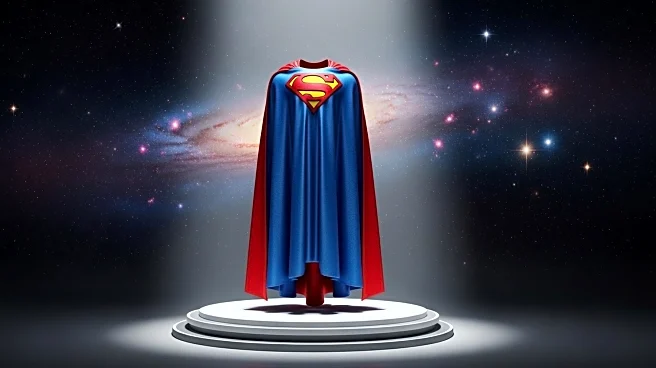What's Happening?
DC Studios, under the leadership of writer-director James Gunn and producer Peter Safran, has announced the release of a new 'Superman' sequel titled 'Man of Tomorrow.' The film is scheduled to hit theaters on July 9, 2027. Gunn shared the news on Instagram, accompanied by an image featuring Superman and Lex Luthor, drawn by DC Comics' Chief Creative Officer Jim Lee. The previous 'Superman' film, released in July, was a commercial success, earning approximately $352 million at the domestic box office over eight weeks. It opened with $122 million in ticket sales in the U.S. and Canada during its first weekend, marking the first DC title to surpass $100 million in its opening weekend since 'Wonder Woman' in 2017.
Why It's Important?
The announcement of 'Man of Tomorrow' signifies DC Studios' continued investment in expanding its superhero cinematic universe. The success of the previous 'Superman' film highlights the franchise's strong market presence and potential for future box office achievements. This development is crucial for DC Studios as it competes with other major studios in the superhero genre, particularly Marvel. The film's immigrant story approach, as seen in the previous installment, may resonate with diverse audiences, potentially broadening its appeal and impact on societal narratives around immigration and identity.
What's Next?
With the release date set for 2027, DC Studios is likely to begin production and marketing efforts for 'Man of Tomorrow' in the coming years. Fans can expect further announcements regarding casting, plot details, and promotional materials as the release date approaches. The film's success could influence DC Studios' strategic decisions in developing future superhero films and expanding its cinematic universe. Stakeholders, including fans, industry analysts, and competitors, will be closely monitoring the film's development and reception.
Beyond the Headlines
The portrayal of Superman as an immigrant story in the previous film introduces a unique narrative angle that could influence cultural discussions around immigration and identity. This approach may encourage other filmmakers to explore similar themes, potentially leading to a broader representation of diverse experiences in mainstream cinema. Additionally, the collaboration between Gunn and Safran could set a precedent for creative partnerships within the industry, impacting future film productions.








